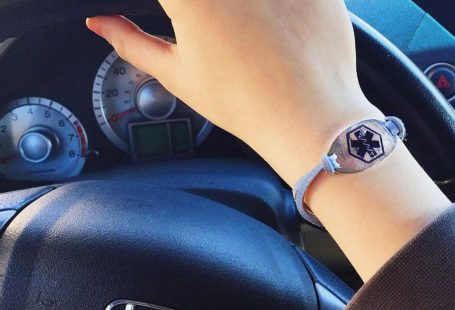Medical alert bracelets are designed to provide first responders with important information regarding your health and are engraved with your unique medical information such as your health conditions, allergies, and medications.
In an emergency, you may not be able to communicate the details of your medical conditions or any allergies you may have to certain medical treatments. Medical alert bracelets relay this vital information to first responders and could potentially save your life.
The following health conditions are the most common diagnoses that require medical jewelry:
1. Diabetes
Diabetes is a chronic health condition that affects how your body turns food into energy. People with diabetes take a medication called insulin that helps to lower blood sugar. If blood sugar is lowered too much, it can cause confusion, distress, and loss of consciousness. Unfortunately, these are the same side effects of alcohol and drug intoxication. Having a medical ID for diabetes alerts first responders to quickly check blood sugar levels and treat you immediately, which can help prevent serious complications such as seizures or coma. Learn more.
2. Heart Conditions
Heart conditions such as coronary artery disease, congestive heart failure, arrhythmia, congenital heart disease, and myocardial infarction require medical jewelry. Complications of heart disease may include heart failure, heart attack, sudden cardiac arrest, and stroke. Signs of heart disease may not be readily visible to first responders in emergency situations. Wearing a medical ID alerts medical personnel that the risk of a heart attack is present and allows them to act quickly to avoid potential damage to the heart. Learn more.
3. Medical Allergies
Allergies to medications require medical jewelry to ensure first responders do not use treatments that may lead to anaphylactic shock. Anaphylaxis is a severe allergic reaction that occurs rapidly and is often life-threatening. Medical alert jewelry engraved with allergies to medications ensures that in an emergency, you are given treatments that are safe for you and avoid the risk of anaphylactic shock. Learn more.
4. Epilepsy
Epilepsy is a neurological disorder that leads to recurring seizures, loss of consciousness, fainting or falling, and confusion. Wearing a medical ID is a simple and effective way to communicate epilepsy, even if you become unconscious or are unable to speak. Seizures do not typically require emergency medical attention in people diagnosed with epilepsy, so a medical alert bracelet can help avoid unnecessary emergency room visits after a seizure has occurred. Learn more.
5. Asthma
Asthma is a chronic disease that affects your lungs causing repeated episodes of wheezing, breathlessness, chest tightness, and coughing. In some cases, airways can narrow and swell enough to trigger a life-threatening asthma attack. In an emergency, the key to stopping an asthma attack is early recognition and treatment. A medical ID is recommended for all types of asthma and will alert first responders to treat symptoms of an asthma attack quickly and appropriately. Learn more.
6. Bleeding Disorders
Bleeding disorders complicate blood clotting and may cause the body to bleed uncontrollably after an injury. In an emergency, bleeding disorders can be hard to identify, especially if the bleeding is internal. Wearing a medical ID bracelet will help first responders treat and monitor bleeds promptly, administer medication to assist blood clotting, and prevent treatments that can aggravate bleeding. Learn more.
7. Chronic Kidney Disease
Chronic kidney disease leads to loss of kidney function over time causing the kidneys to not be able to filter blood effectively. This causes excess fluid and waste from the blood to remain in the body and may lead to other health problems such as heart disease and stroke. In an emergency, a medical ID will alert first responders that you may require special medical attention and monitoring due to kidney disease, such as dialysis. Learn more.
8. Fibromyalgia
Fibromyalgia is a chronic rheumatic condition causing widespread musculoskeletal pain, fatigue, memory, and mood disorder. Patients diagnosed with fibromyalgia are at risk for flares which can be unbearable and cause loss of consciousness. A medical ID is recommended to inform health professionals of this invisible condition to avoid misdiagnosis and help you receive appropriate medical treatment. Learn more.
Not wearing a medical ID when you have these chronic illnesses may lead to a misdiagnosis of symptoms or a delay in appropriate treatment. Medical jewelry will also help avoid unnecessary hospitalization. If you have a health condition requiring medical jewelry, get started designing a medical ID bracelet today!







